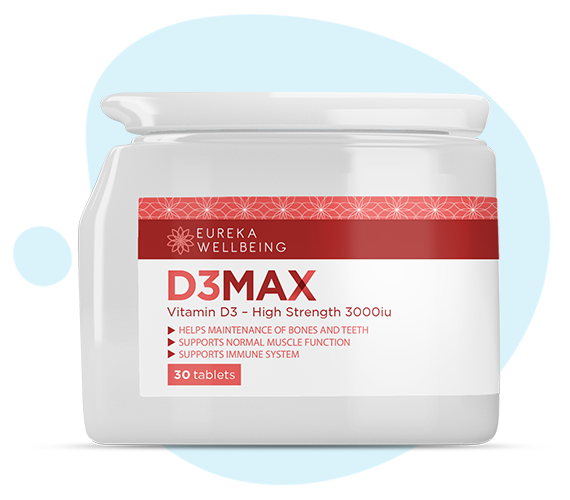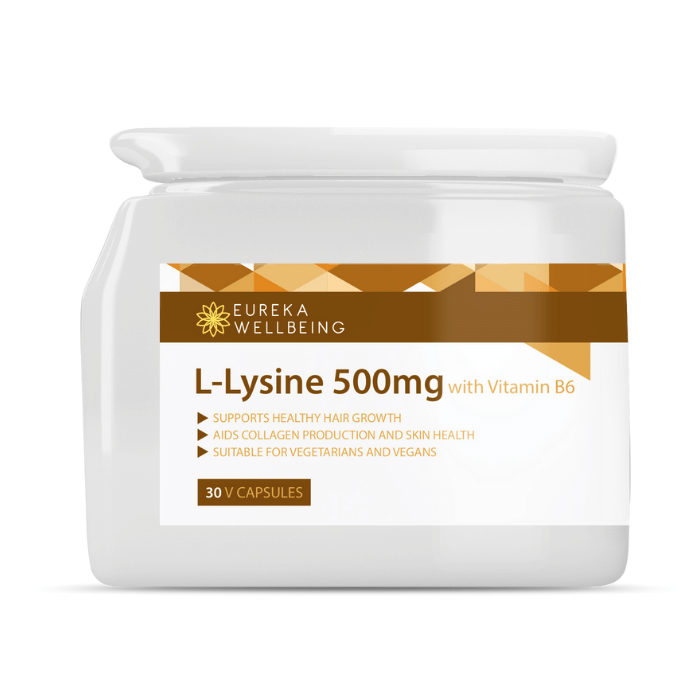Free Vitamin D3 Max – High Strength 3000iu – 1 Month Supply(30 Tablets)
Vitamin D helps to regulate the amount of calcium and phosphate in the body. These nutrients are needed to keep bones, teeth and muscles healthy.
Meet your daily Vitamin D requirements with free supply of Eureka Vitamin D3 Max Supplements.
Get started with just £2.95 shipping and handling charges.
£0.00
Description
✓ Important for maintaining healthy bones, blood and muscle
✓ Easy to swallow tablet form
✓ Get the goodness of Vitamin D3 throughout the whole year, come rain or shine
What is Vitamin D?
According to NHS Choices Vitamin D helps to regulate the amount of calcium and phosphate in the body. These nutrients are needed to keep bones, teeth and muscles healthy. A lack of vitamin D can lead to bone deformities such as rickets in children, and bone pain caused by a condition called osteomalacia in adults. Vitamin D is a fat soluble vitamin found in foods such as oily fish, butter and egg yolk. It is formed through the action of UV sunlight on the skin. Vitamin D has functions and benefits that are probably more wide ranging than any other vitamin. There has been huge renewed interest in vitamin D recently, with new global research showing that the health benefits of this nutrient stretch beyond bone health. There is increasing evidence for the beneficial effects from dietary Vitamin D which has shown benefits for its contribution to:
- Maintenance of normal bones and teeth
- Normal absorption and utilisation of calcium and phosphorus
- Normal muscle function
- Normal blood calcium levels
- Normal function of the immune system
- The process of cell division
Why do we need Vitamin D? – the sunshine vitamin
While our bodies manufacture Vitamin D on exposure to sunshine, the levels in many countries is so weak during the winter months that our body makes little or no Vitamin D at all, meaning that dietary supplements are often the best way to safeguard intakes of Vitamin D. Many populations, including the majority of those in Europe, require an additional dietary source of Vitamin D from supplementation to achieve and maintain an adequate status of Vitamin D throughout the year. In addition, the body does not generate Vitamin D when sitting behind a glass window, whether in your car or at home, because these UV rays cannot penetrate glass to generate Vitamin D in the skin. Sunscreens, even weak ones, while essential to protect the skin, can affect the body’s ability to generate vital Vitamin D.
What are Vitamin D deficiency symptoms?
If you think you may be have vitamin D deficiency symptoms then it is vital that you speak to your GP to find out for sure. According to the leaflet provided by West London Mental Health NHS trust: ( http://wlmht.nhs.uk/wp-content/uploads/2013/01/Vitamin-D-leaflet-A5-8pp.pdf ) You may be at greater risk of developing conditions such as diabetes, heart diseases, certain cancers and possibly weight gain. When vitamin D levels are very low, symptoms may include tiredness, weakness, muscle and bone pain. You may not be as mentally healthy as you could be.
What are good sources of Vitamin D?
From about late March/early April to the end of September, most people should be able to get all the Vitamin D they need from sunlight. The body creates Vitamin D from direct sunlight on the skin when outdoors. But between October and early March we don’t get enough vitamin D from sunlight. Vitamin D is also found in a small number of foods. Vitamin D food sources include:
- oily fish – such as salmon, sardines, herring, mackerel and fresh tuna
- red meat
- liver
- egg yolks
- fortified foods – such as most fat spreads and some breakfast cereals
Another source of vitamin D is dietary supplements. In the UK, cows’ milk is generally not a good source of vitamin D because it isn’t fortified, as it is in some other countries.
How much vitamin D do I need?
Babies up to the age of one year need 8.5-10mcg of vitamin D a day. Children from the age of one year and adults need 10mcg of vitamin D a day. This includes pregnant and breastfeeding women, and people at risk of vitamin D deficiency. From about late March/early April to the end of September, the majority of people should be able to get all the vitamin D they need from sunlight on their skin.
Should I take Vitamin D tablets?
The UK’s Department of Health recommends that:
- breastfed babies from birth to one year of age should be given a daily supplement containing 8.5-10mcg of vitamin D to make sure they get enough
- formula-fed babies shouldn’t be given a vitamin D supplement until they’re having less than 500ml (about a pint) of infant formula a day, as infant formula is fortified with vitamin D
- children aged 1-4 years old should be given a daily supplement containing 10mcg of vitamin D
You can buy vitamin D supplements or vitamin drops containing vitamin D (for under fives) at most pharmacies and supermarkets. Women and children who qualify for the Healthy Start scheme can get free supplements containing the recommended amounts of vitamin D. See the Healthy Start website for more information.
For adults and children over 5 years old
The UK’s Department of Health recommends that: During the autumn and winter, you need to get vitamin D from your diet because the sun isn’t strong enough for the body to make vitamin D. But since it’s difficult for people to get enough vitamin D from food alone, everyone (including pregnant and breastfeeding women) should consider taking a daily supplement containing 10mcg of vitamin D during the autumn and winter. Between late March/early April to the end of September, most people can get all the vitamin D they need through sunlight on their skin and from a balanced diet. You may choose not to take a vitamin D supplement during these months.
People at risk of vitamin D deficiency
The UK’s Department of Health recommends that: Some people won’t get enough vitamin D from sunlight because they have very little or no sunshine exposure. The Department of Health recommends that you take a daily supplement containing 10mcg of vitamin D throughout the year if you:
- aren’t often outdoors – for example, if you’re frail or housebound
- are in an institution like a care home
- usually wear clothes that cover up most of your skin when outdoors
People with dark skin from African, African-Caribbean and south Asian backgrounds may also not get enough vitamin D from sunlight. They should consider taking a daily supplement containing 10mcg of vitamin D throughout the year.
There are a number of reasons why Vitamin D supplementation is now advocated including:
- Government health advice to reduce sun exposure which can mean less Vitamin D is produced naturally by the body.
- Reduced sun exposure in certain groups of the population e.g. older people, for religious reasons/clothing, certain occupations, medical reasons, those with dark skin (as greater skin melanin content can reduce the skin’s ability to produce Vitamin D).
- Increased requirement at certain life stages e.g. the elderly population – whose skin may not be able to synthesise Vitamin D effectively.
- Those with increased dietary intolerances (e.g. lactose and dairy), allergens.
- People who are on a diet.
Vitamin D3 has long been known to aid in calcium absorption, but emerging research is suggesting a far wider role for Vitamin D in health. Our formulation enables you to receive the goodness of Vitamin D3 throughout the whole year, come rain or shine.
Each of our tablets provide on average 75μg (micrograms) / 3000iu of Vitamin D3 which is 1500% of the EC Recommended Daily Allowance.
Approved health claims from European Food Safety Authority (EFSA):
Calcium and phosphorus: Vitamin D contributes to normal absorption/ utilisation of calcium and phosphorus.
Blood calcium levels: Vitamin D contributes to normal blood calcium levels.
Normal bones: Vitamin D contributes to the maintenance of normal bones.
Muscle function: Vitamin D contributes to the maintenance of normal muscle function.
Teeth:Vitamin D contributes to the maintenance of normal teeth.
Immune system: Vitamin D contributes to the normal function of the immune system.
Cell division: Vitamin D has a role in the process of cell division.
Nutritional Information
Vitamin D3 75µg 1500% *% RI = % Reference Intake
Ingredients
Vitamin D3 (Cholecalciferol) Modified Maize Based Starch Bulking Agents: Microcrystalline Cellulose; Di Calcium Phosphate BP Anti-Caking Agents: Silica; Magnesium Stearate
Important Information
Take 1 tablet a day Do not exceed the recommended daily consumption. Please consult with your Healthcare Professional if you are pregnant, lactating or if you are taking any other medication. Not to be used as a substitute for a varied balanced diet and healthy lifestyle. Keep out of the reach and sight of children. Store in a cool dry place, away from direct sunlight.
If you’re looking where to buy Vitamin D pills, Vitamin D Supplements, or High Strength Vitamin D then Eureka Supplement’s Vitamin D Tablets are a great Vitamin D supplement to support your lifestyle.
Additional information
| Weight | 0.6 kg |
|---|







Reviews
There are no reviews yet.